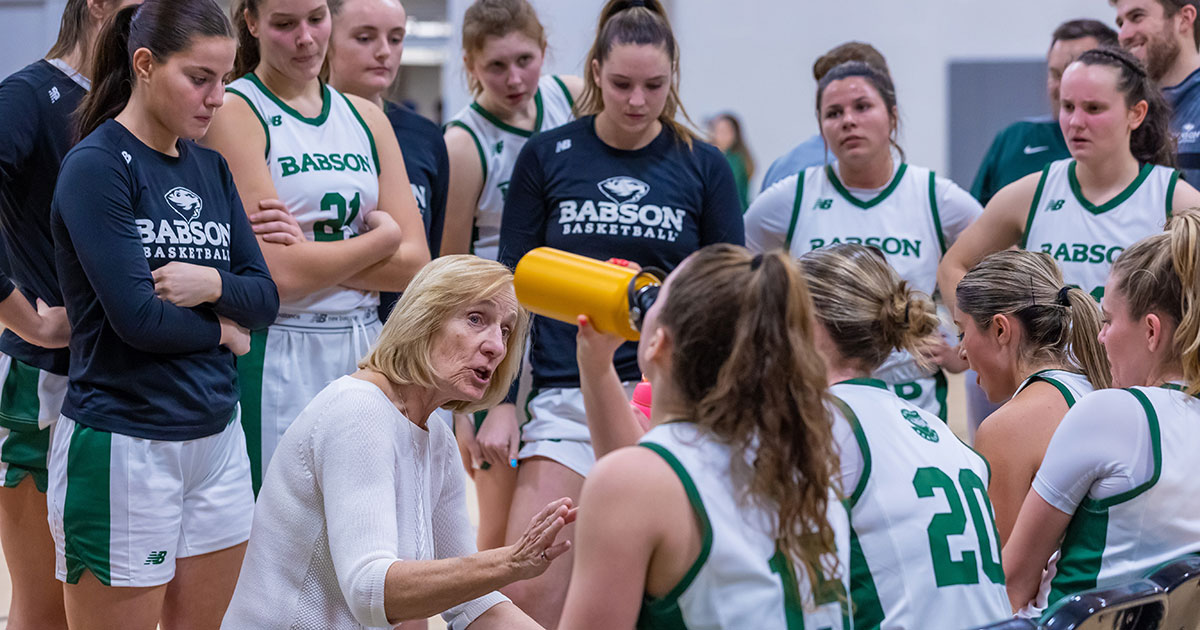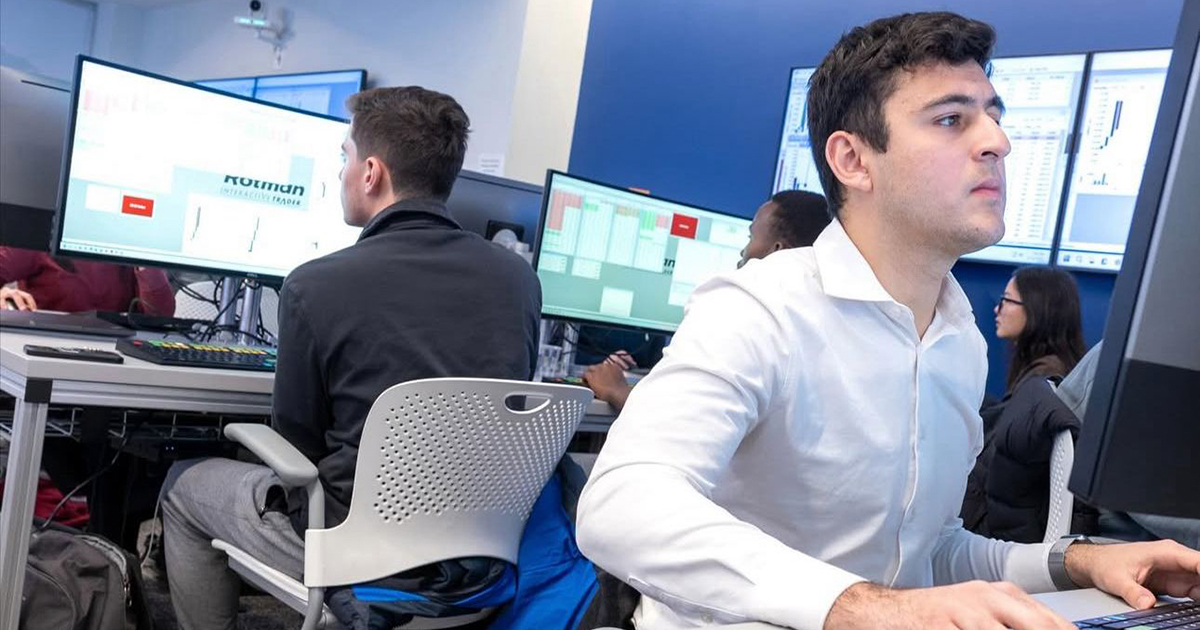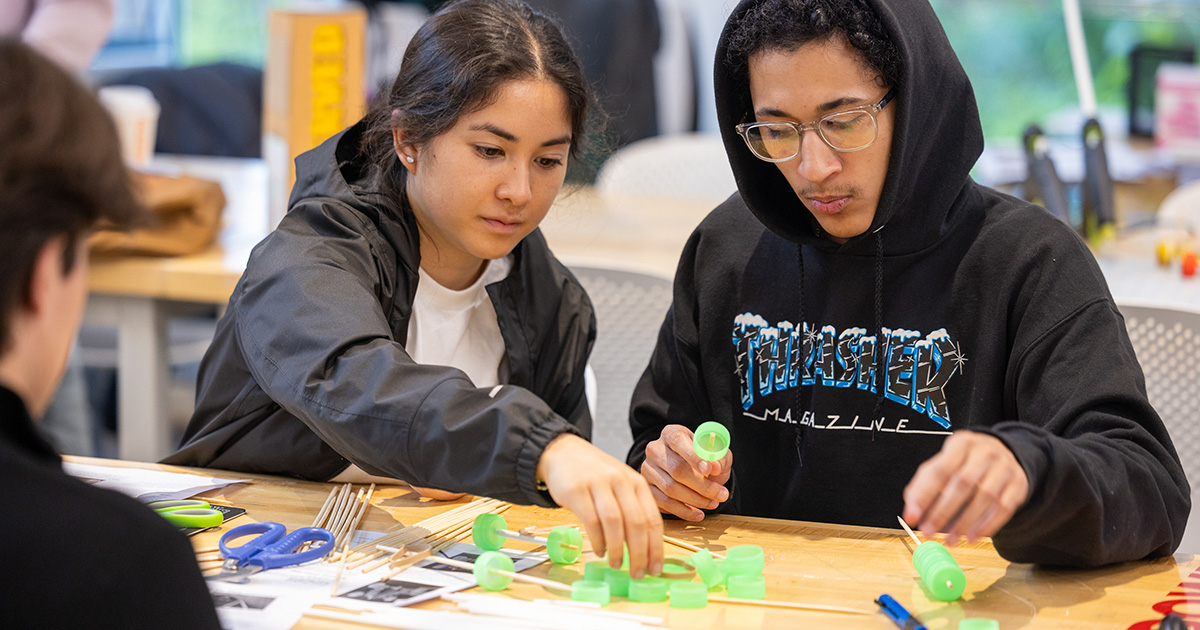A Babson Basketball Legend Looks Back

Before coming to Babson College in 1984, Judy Blinstrub debated becoming a teacher. She had already been coaching at the high school level for six years, but she thought she might make more of an impact on students if she transitioned to the classroom.
Then she met with Bob Hartwell, who was Babson’s director of athletics. He told her of the power of coaching to inspire young people, to influence their lives both on and off the court. Blinstrub was convinced. “I was so impressed by all the benefits of becoming a coach,” she says. “You could do as much teaching as a coach as you can in a classroom.”
Last summer, Blinstrub announced that she was retiring as head coach of the Babson women’s basketball team, a position she held for an astounding 39 seasons. She coached more than 1,000 games, with her teams earning 719 wins and 12 NCAA tournament appearances.
CELEBRATE THE CAREER OF JUDY BLINSTRUB: When the Babson Beavers women’s basketball team takes on WPI on Saturday, January 27, at 1 p.m., the College will honor Blinstrub with an on-court celebration and postgame reception.
Blinstrub’s legacy, though, extends beyond basketball. For more than three decades, she served as a member of Babson Athletics department’s senior staff, retiring as senior associate athletics director. She also was head coach of the Babson women’s soccer team for 20 seasons before stepping down from the role in 2004.
Since leaving Babson and her long coaching career, Blinstrub has been doing some of the typical things one does in retirement: traveling, golfing, visiting people she hasn’t seen in a while. “It’s the first September I wasn’t getting ready for school since kindergarten,” she says.
This coming Saturday, January 27, Babson will celebrate Blinstrub and her remarkable career at a women’s basketball game. Ahead of the festivities, Blinstrub took time to answer a few questions and look back at her time at Babson.
How does it feel to be away from the basketball court this time of year?
“It is hard. I miss the players and going to practice every day. I still watch them and have gone to some games. They are good about keeping in touch and reaching out if they need me.”
Why did you decide to retire?
“I thought it was the right time to do something new in my life. I have been coaching since I graduated from college in 1977. I wanted to spend more time with my husband, Jim, and my family and friends. I lost my sister and mom this past year, which puts things in perspective. It made me want to share more time with others.”

Do you remember your first coaching job?
“My first job coaching was great. I was coaching at my old high school, Mount Alvernia, in Newton, Massachusetts. When I graduated from college, the principal called me and asked me to do it. She gave me the opportunity.
“It was a great experience. I got my feet wet. I was comfortable there. It was a small school, and I knew a lot of the people there. It was like going back to family. They taught me a lot.”
What are the keys to being a good coach?
“I believe the most important thing is how you relate to your players, what buttons to push, and to remember that they are more than basketball players. You are teaching so much more than the sport. You need to be teaching life skills when you are coaching. You are teaching how to overcome adversity, make quick decisions, and how to work as a team. There are so many things that correlate to life. So many student-athletes at Babson are successful. On a team, you go through hard times together and you learn from it. That’s why student-athletes do so well at Babson.”
When you look back on your time at Babson, what do you think about?
“I think of the people I have met through Babson. I think about all the wonderful relationships I have developed over the years. Babson has been part of my life for so long. I remember how honored I was to be awarded the prestigious Carpenter Prize. To be considered among all the influential people that have gone through Babson—it just validated to me how my career impacted the entire community.”
“To see my alums at games with their children, to hear about the success stories in their careers and how happy they are, is such a joy.”
Judy Blinstrub
Tell me about that four-year run that started with the 2009-2010 season, a time when the team only lost 11 games in total, went undefeated in NEWMAC play, and made the NCAA tournament every year.
“It was an amazing run. They were great players, great people to coach. They put the team before their personal success. They all accepted their roles. Some players off the bench could have started elsewhere. The ultimate goal was to win the NEWMAC and go to the NCAAs. They were willing to sacrifice to do that.
“Unfortunately, New England basketball at this time was so strong. Babson really wasn’t known for women’s sports, so we weren’t always awarded home court in the NCAA tournament. The way they seed things now has changed, but back then, we were still trying to fight that battle of being recognized. I wanted this team to get the chance to play at home and in the Final Four. They had earned it, but things just didn’t fall into place. It was tough. In basketball, it is so hard to get to the Final Four. It is a long road.”
What is the hope you have for your players after they graduate?
“It is always my hope they have developed as good people and are successful in the path they choose. To see my alums at games with their children, to hear about the success stories in their careers and how happy they are, is such a joy.”
To make a donation to the Women’s Basketball Fund, click here.
Posted in Community




